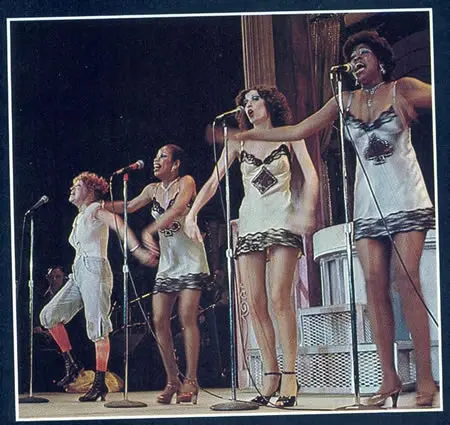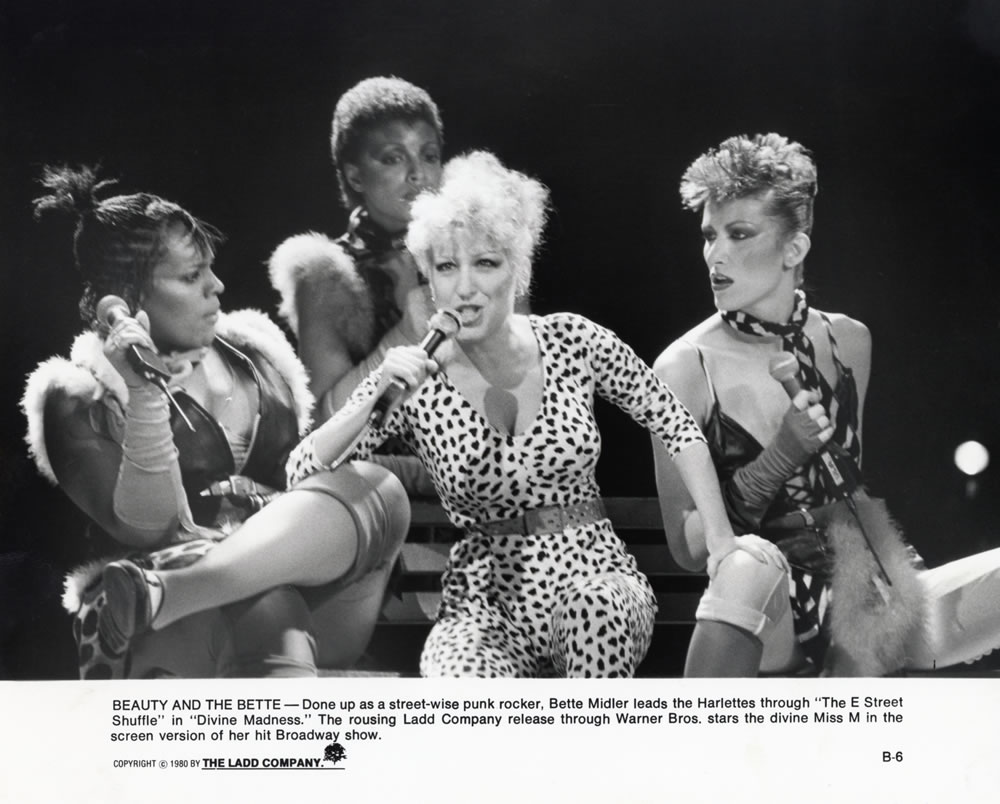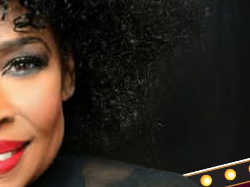ROUTES
Sharon Redd, Ula Hedwig, Charlotte Crossley -The Harlettes
By Leon MacDonald
6/1978
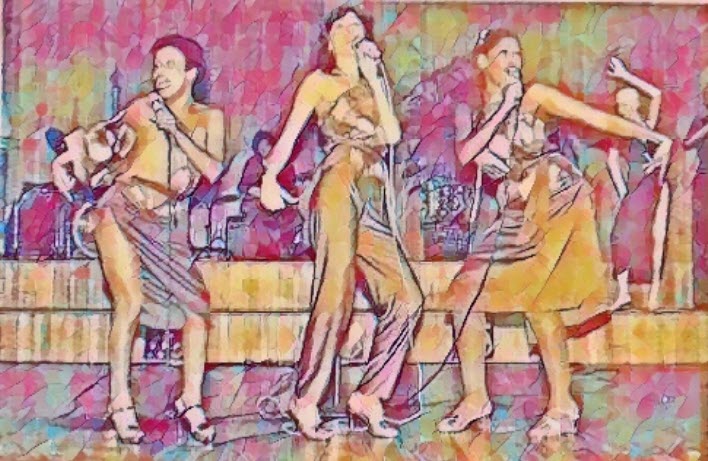
Formally Of The Harlettes: Sharon Redd and Charlotte Crossley are two beautiful brown ladies with some of the best pipes in the music business.
Add the sleek willowy frame of Ula Hedwig and a voice that ranges from the purest high tones to the gutsiest blue notes, and what you get is some of the freshest and most dynamic music being created in the New York nightclub circuit.
They were the Harlettes, and first rose to prominence as the backup singers for pop star Bette Midler, whom they affectionately call “Miss M.” Their music scope encompasses songs from the thirties and forties, and more modern rock, country, blues, and gospel.
Before Bette Midler: The Early Years
Each of the ladies had considerable singing and theatrical experience before teaming up with Bette Midler. Sharon Redd sang backup for Barry Manilow, Helen Reddy and other topflight singers. She has made numerous television appearances as an actress in the US. For nearly three years, she toured Europe as a solo singer and even hosted her own popular TV show in Australia. When she returned in the early seventies, she met and began to work with Bette.
Charlotte Crossley is the comedienne in the group, she has an intrinsic ability to win your favor. She is one of the original Harlettes, with the group for five years. She is tall, shapely, and sensuous. A native of Chicago, Charlotte studied music and theatre with a dream of appearing on Broadway. That dream was realized when she was selected to appear in Jesus Christ, Superstar in the mid-seventies.
During this time, Charlotte became a popular background singer on recording dates and radio commercial jingles. She soon established a “rep.” Bette Midler heard her and offered her a job as one of the Harlettes.
Ula Hedwig is a quiet member, exuding warmth and honesty. She is of Polish descent. Ula started listening to records in the late sixties and says she listened to everything! She was especially drawn to the nuances and rhythms of Black music. This early influence is evident in her phrasing and style. Like the other ladies, Ula also has roots in the theatre. She made her Broadway debut as a singer-dancer-actress in Hair, followed by the production of Godspell. It was these appearances and tours with Bette Midler that helped the Harlettes sharpen their music and performing skills, increase the public’s awareness of them, and brought them to the attention of record companies
Striking Out On Their Own: Reno Sweeney’s

Their recent appearance at the popular showcase cabaret, Reno Sweeney’s, is the first in a series of promotional engagements that will take them from coast to coast. The national tour was mounted to promote their debut album on CBS records, entitled Sharon Redd • Ula Hedwig • Charlotte Crossley • Formerly ofhttps://bootlegbetty.com/2013/01/17/betteback-may-20-1977-bette-takes-in-formally-the-harlettes/ the Harlettes.
During the group’s two-week run at Reno’s, ROUTES caught their act and talked with them between performances. Phones ringing, fans and friends dropping in to reminisce, to say hello, or to express their pleasure with the show; constant chatter filtering in from the corridor outside the dressing room door, people waiting to get in, to see or touch the divas who wrecked the place.
This kind of climate reveals how demanding a career on the stage can be, a life that has its own reality. But in spite of the frenzy of activity and the interruptions, these ladies handled the situation, alternating to keep the interview progressing while another member conducted the other business.
My innermost feelings? Ask me, baby, ask me anything. I get so tired of those interviews that only talk about how you got started in the business. Ask me, she quips.
Formerly Of The Harlettes: The Interview
Sharon Redd — the intellectual of the group, set the tone for the interview by responding to questions about her innermost feelings in a warm, up-front manner.
The setting: A tiny, shotgun-style dressing room at Reno Sweeney’s. Its decor resembles a cozy attic.
ROUTES: Who gave the group the name Harlettes? Does the name have any special meaning?
Charlotte: As you know, Bette’s show was kind of camp, and we were called the Harlettes, a sort of inside joke that camps up the word Harlot.
ROUTES: How much of an influence did working with Bette have on the group’s current routine?
Ula: Together we tried out, reworked, and discarded lots of material before settling on the current act. In mounting the show we wanted to present many phases of show business. In addition to singing, we dance joke with the audience and employ short monologues and skits. Our act is more than just a nightclub performance it’s theatre, tailored with elements that reach out and grab the audience.
Sharon: With Bette, we learned the importance of theatre, that is, creating a character that enhances the music we were singing. In addition, this helped to sustain a high-performance level under widely varying conditions and locations. Bette emphasized the importance of the group to her show and we learned to work together.
ROUTES: Your first solo LP was produced by David Rubinson, one of the heavies in the business. Isn’t that rather unusual for a new group?
Ula: David read a rave review of the Harlettes in the SoHo News, came to see the group, signed us to a production contract, and persuaded Columbia Records to be interested in the group.
Sharon Redd (Artist), Ula Hedwig (Artist), Charlotte Crossley (Artist) Format: Vinyl
Vinyl Only from 9.98 – 195.00
ROUTES: When did the group decide to appear without Bette?
Charlotte: Last year. After Bette recorded her albums when we sang background, she would go on promotional tours, and when they ended, Bette would say that she was going to take a couple of months off to prepare the next album. We each went off into our own thing — studio singing, straight acting, and things like that. A club owner who knew us with Bette called Sharon and asked if we ever appeared as a group when Bette was not working. She told him that we had not worked up a solo act. He suggested that we do this and appear at his club since he felt we were strong enough to draw an audience.
Ula: We got together and began to play with songs and materials to see whether it might work. My neighbor, Marc Shaiman, a professional musical coach, agreed to work out the musical harmonies. Sharon’s friend, Andre De Shields, who played the role of the wizard in the Broadway musical The Wiz gave the act some direction. Andre declared us “monuments,” he gave each of us an attitude that revealed different aspects of our personality, and the overall makeup of the group. Sharon’s character is saucy, glamorous, and seductive. Charlotte’s character is flippant, daring, sensuous, and a diva on parade. My character or “monument” is pensive, shy, and gentle.
Sharon: Andre said, “Be a monument baby because everybody will copy everything you do. So be a monument and make an impression.” I was watching Soul Train a few days ago and I saw a couple of divas with our exact outfits on. So that’s how receptive the public is to new ideas.
Sharon: Before we signed with Columbia, other record companies were interested but they couldn’t decide what to do with us. We see ourselves as being able to please just about any audience. We would like a gold record in all the markets — pop, rock, folk, country & western, jazz, gospel, what have you.
ROUTES: Have there been any special problems?
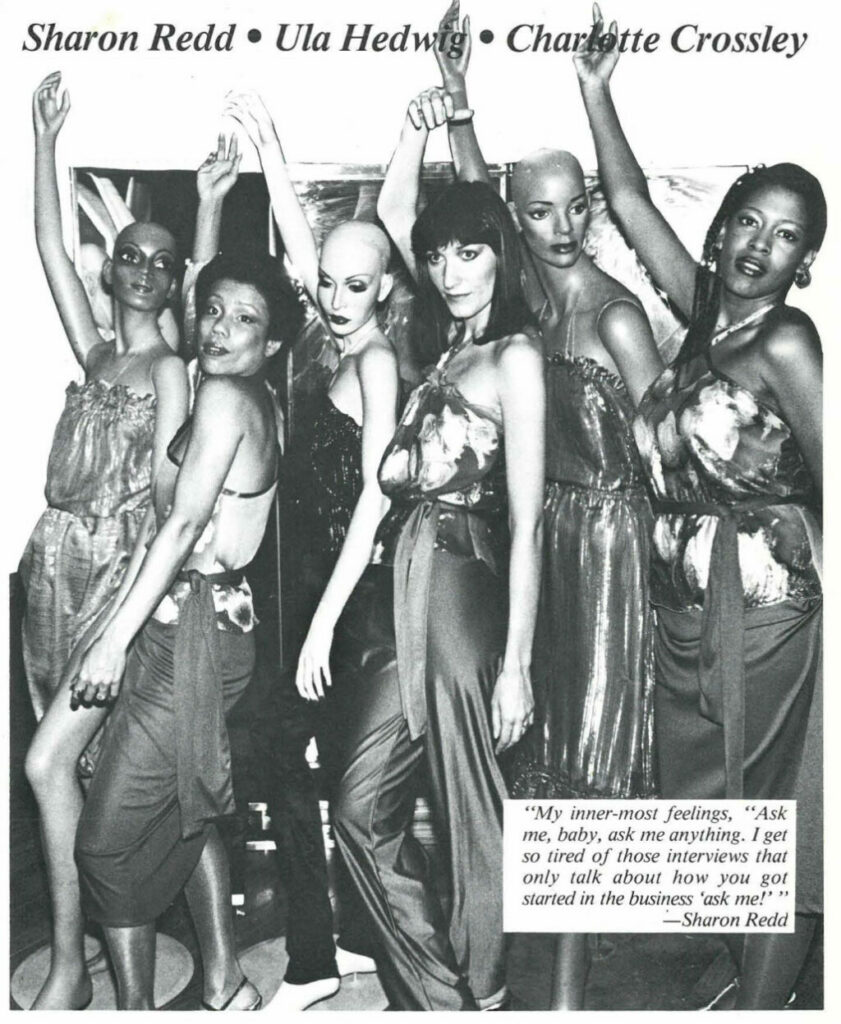
Sharon: There is the very special problem of finding accurate, trustworthy information about the business side of music as well as deciding which offers will take your career in the right direction and deciding who to trust.
ROUTES: What about the financial arrangements? Does the group make a lot of money?
Ula: Well, about money…
Charlotte: What money?
Ula: We each have an allowance of $150 a week straight salary. Transportation, hotels, meals, and other expenses of touring are paid by the record company.
ROUTES: Is that an advance that has to be paid back out of record royalties, or is it an investment by the record company?
Ula: These outlays will be recovered by the record company before we make anything from record royalties. We figure we’ll not make any real money until we’ve had two or three gold records. There are a lot of names that are not making any money because it took so much of an investment to get them off the ground.
ROUTES: Does the fact that the group is racially mixed help or hurt the group’s commercial appeal?
Sharon: It helps, but it just happened that way. Charlotte succeeded Melissa Manchester; she became Bette’s first Brown diva. The concept of being racially mixed is the primary reason for the success of the group. Ula’s image is what middle America can relate to. She’s calm and gentle, the typical ”touch me in the morning” figure, the kind of picture that many men would go wild over. Charlotte brings to the group fire, sex, theatre, and humor. My experiences contribute — the soul of the church and a sense of stability to the performance. So the group has something to which everyone can relate.
ROUTES: Have you had any special problems mixing a career with a personal life? I mean, does pursuing a career limit your opportunities for meaningful relationships?
Sharon: Well, we do meet a lot of different people. Naturally, some of the men make a play. Some do it because they are genuinely interested, and some for the status. The funny thing is, some men are jealous of the attention we receive. I just broke up with a guy I cared for deeply because of the conflict in schedules. It happened the night before we opened here at Reno’s. I was somewhat taken by my ability to handle it. On opening night I gave one of the best performances of my career. I was faced with a difficult decision: My career comes first and personal relationships are second. I have worked too long and too hard to let my career take a back seat for the sake of my love life.
Charlotte: My old man was in show business when he and I were seeing each other; and it seemed like the harder I worked to further my career, the more he neglected his own. I felt that he was good at what he did, and should not have copped out. Suddenly my career started to blossom, and tension entered the relationship; as a result, we are no longer seeing each other. Now things are different. The man that I am seeing is more successful than I am, and we are in the same business; this relationship works.
ROUTES: Were there special problems with Bette Midler when the group decided to do a solo act?
Charlotte: Oh, no. When we decided to go out on our own, Bette did a lot to help us. Jokingly she always said, “don’t sing so loud.” Bette is a very special lady; she opened many doors for us and many other people. Barry Manilow used to be her musical conductor.
ROUTES: Who is the hot-tempered personality in the group?
Sharon: Charlotte is.

Charlotte: I get angry and get it out of the way. I had a nervous breakdown a few years ago because my husband and I never discussed any of our problems. I have come to realize that it’s best for me to express my feelings. I find that this approach gets me into trouble, but I don’t worry about it. I lived in a house where I couldn’t talk back to my father. Her eyes flashed as she focused them on the ceiling as if this gesture would aid her in recalling her past. When I turned eighteen, my father told me that I would have to pay him rent or move out. I agreed to pay him rent but it didn’t work out. Though I paid him rent, he would get upset because I would stay out for three or four days. I told him, I am an adult, and I want to live my own life. For years, I lived under that man’s roof with him preaching to me that he wasn’t going to allow me to go into show business. I love my father, but when I left home to go out on my own, it felt like I was freeing myself from eighteen years of verbal suppression. So that’s why I value the idea of expressing my feelings.
ROUTES: Will the group be working with Bette in the future?
Charlotte: No. Bette has a new group and we intend to really try to make it as a solo act.
ROUTES: Do you think your association with a giant record company will hurt or help you? Some artists complain of being lost in the jungle of big names when trying to get started.
Ula: If your record is getting airplay, the record company gets on it. We had a lot of people who knew us before, and they called the radio stations and bought the album that seems to interest the company.
ROUTES: Do you feel that it was worth the effort to get this far?
Ula: I definitely do.
Charlotte: I like the excitement and challenge of meeting and working with many different people. In our audiences, we see young, old, gay, and straight. Black, white, rich, and poor, and I like that.
Sharon: I made a decision. This is my life, and I thank God there’s been enough success to make it all seem worthwhile.
